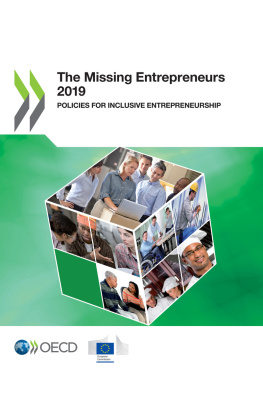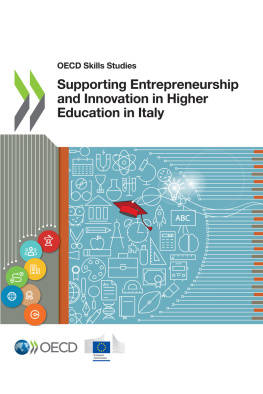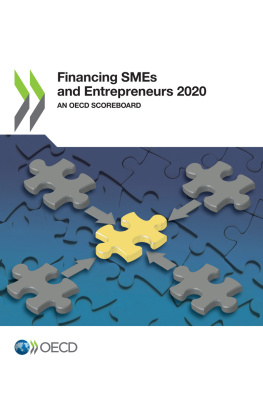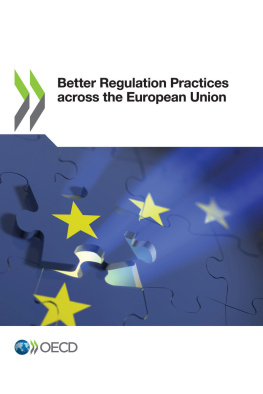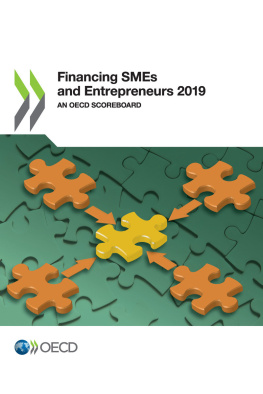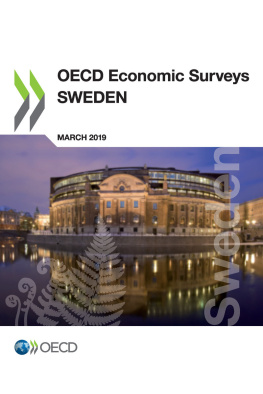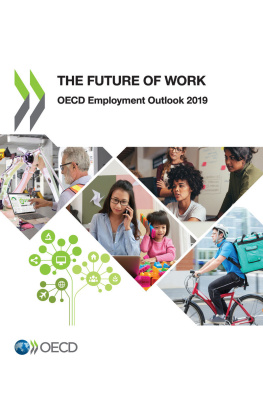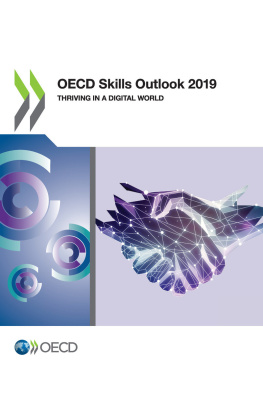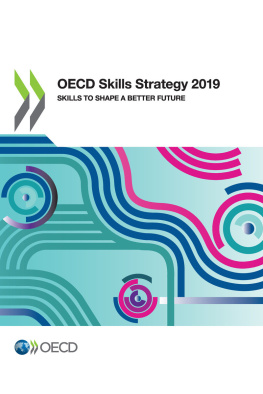OECD and European Union - The Missing Entrepreneurs 2019
Here you can read online OECD and European Union - The Missing Entrepreneurs 2019 full text of the book (entire story) in english for free. Download pdf and epub, get meaning, cover and reviews about this ebook. year: 2019, publisher: OECD Publishing, genre: Business. Description of the work, (preface) as well as reviews are available. Best literature library LitArk.com created for fans of good reading and offers a wide selection of genres:
Romance novel
Science fiction
Adventure
Detective
Science
History
Home and family
Prose
Art
Politics
Computer
Non-fiction
Religion
Business
Children
Humor
Choose a favorite category and find really read worthwhile books. Enjoy immersion in the world of imagination, feel the emotions of the characters or learn something new for yourself, make an fascinating discovery.
- Book:The Missing Entrepreneurs 2019
- Author:
- Publisher:OECD Publishing
- Genre:
- Year:2019
- Rating:5 / 5
- Favourites:Add to favourites
- Your mark:
- 100
- 1
- 2
- 3
- 4
- 5
The Missing Entrepreneurs 2019: summary, description and annotation
We offer to read an annotation, description, summary or preface (depends on what the author of the book "The Missing Entrepreneurs 2019" wrote himself). If you haven't found the necessary information about the book — write in the comments, we will try to find it.
The Missing Entrepreneurs 2019 — read online for free the complete book (whole text) full work
Below is the text of the book, divided by pages. System saving the place of the last page read, allows you to conveniently read the book "The Missing Entrepreneurs 2019" online for free, without having to search again every time where you left off. Put a bookmark, and you can go to the page where you finished reading at any time.
Font size:
Interval:
Bookmark:
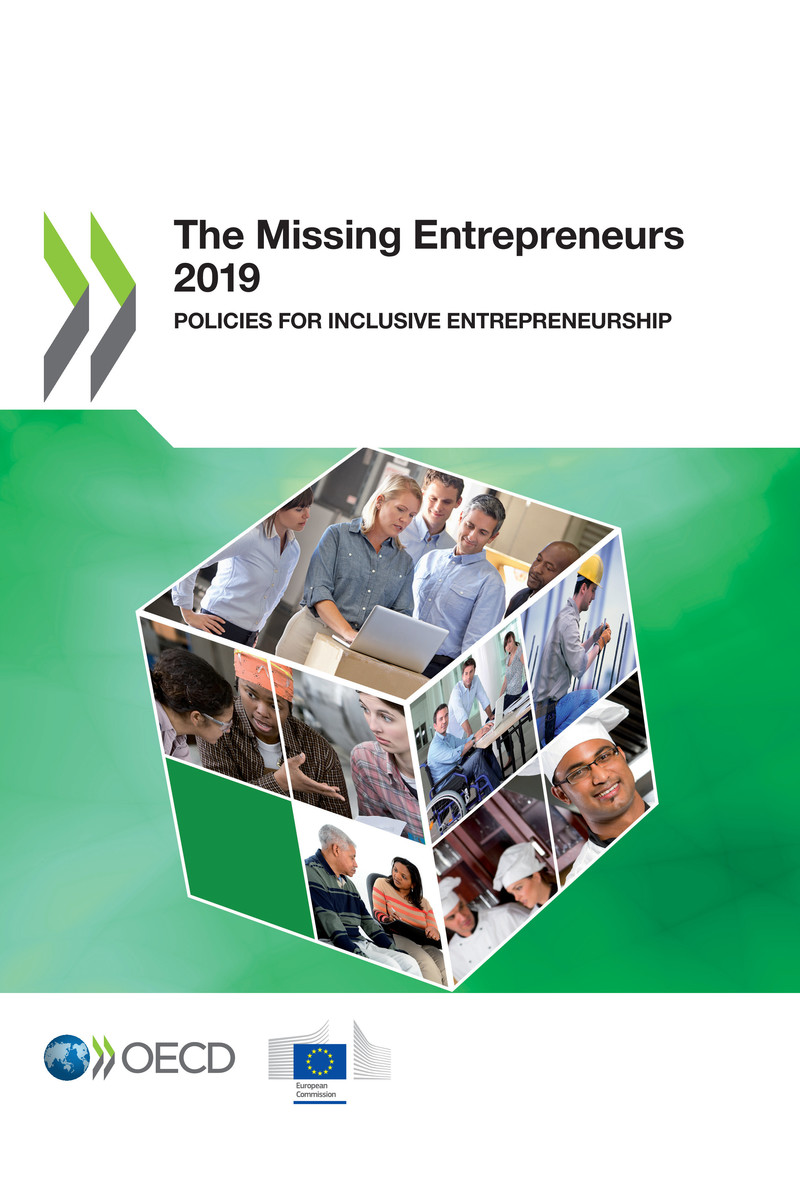
OECD/European Union (2019), The Missing Entrepreneurs 2019: Policies for Inclusive Entrepreneurship , OECD Publishing, Paris, https://doi.org/10.1787/3ed84801-en .
The information in this document with reference to Cyprus relates to the southern part of the Island. There is no single authority representing both Turkish and Greek Cypriot people on the Island. Turkey recognises the Turkish Republic of Northern Cyprus (TRNC). Until a lasting and equitable solution is found within the context of the United Nations, Turkey shall preserve its position concerning the Cyprus issue.
The Republic of Cyprus is recognised by all members of the United Nations with the exception of Turkey. The information in this document relates to the area under the effective control of the Government of the Republic of Cyprus.
Many people in OECD countries remain excluded from the labour market where wage inequality is rising. Entrepreneurship must be part of the solution. Entrepreneurs innovate, finding new solutions to social and economic problems, they identify and exploit growth opportunities, they provide jobs for themselves and others, and with good projects they generate good incomes. But for the full potential of entrepreneurship to be achieved for growth, innovation and inclusion, entrepreneurship needs to be a feasible opportunity for all people, whatever social group they come from, including those currently unemployed and inactive. Today this is not the case. The share of the population involved in entrepreneurship, and particularly entrepreneurship with innovation and growth prospects, is lower for many groups such as women, youth, migrants and the formerly unemployed, who tend to face greater barriers in areas such as skills, finance, networks and institutions. We need to break down the barriers to entrepreneurship for all populations, so that we can tap into the creativity, dynamism and innovation of more people.
Inclusive entrepreneurship policies can play an important role in giving more people the chance to be entrepreneurs and seek to support the creation of sustainable businesses by people belonging to groups that are under-represented in entrepreneurship. Reports such as the Missing Entrepreneurs have an important role in raising the profile of these challenges and advising governments on potential actions. The new Better Entrepreneurship Policy Tool ( www.betterentrepreneurship.eu ) goes even further by providing an interactive self-assessment exercise and learning materials for policy makers to help them strengthen the design and implementation of inclusive entrepreneurship policies.
This edition of the Missing Entrepreneurs includes updated data on the trends in self-employment and entrepreneurship activities by women, youth, seniors, the unemployed and immigrants. We can see that the composition of entrepreneurs in the European Union is changing, notably that more women are becoming self-employed. The number of self-employed women increased by 4.3% over the past decade whereas the number of self-employed men declined by 4.9%. Moreover, the self-employed population is aging in the European Union as the population ages. The number of self-employed seniors (50-64 years old) increased by nearly 20% between 2009 and 2018.
This report also looks at the potential for leveraging the opportunities created by digital transformation to increase the scope of entrepreneurship for these population groups. Digital transformation is having a growing impact on the daily operations of businesses and the self-employed, yet only 2% of SMEs in the European Union are taking full advantage of the digital economy. Policy makers are therefore exploring what can be done to help more entrepreneurs and SMEs leverage the potential of the digital economy, including tailored schemes to support entrepreneurs from under-represented and disadvantaged groups. Policy makers must monitor and evaluate these schemes so that we can learn about what works and what does not. The report also examines a related issue, business growth by entrepreneurs from population groups that are disadvantaged and under-represented in entrepreneurship. Businesses that transform into larger businesses are important for economies because they are responsible for a disproportionate share of job creation and innovation. While very few entrepreneurs are successful at achieving high-growth for their businesses, women, youth, seniors, immigrants and those starting from unemployment are even less likely to do so.
The OECD would like to thank the European Commission for their partnership on this important programme of work. Together we have built up an evidence base on entrepreneurship activities undertaken by people who face the greatest challenges in the labour market, and on the various policy approaches to facilitate inclusive entrepreneurship. We are committed to continue offering national, regional and local policy makers sound evidence and tools to design and implement effective inclusive entrepreneurship policies and programmes.

Lamia Kamal-Chaoui
Director,
Centre for Entrepreneurship, SMEs, Regions and Cities, OECD
This joint OECD/EU publication is released at a moment in time where global overarching issues such as climate change, social fairness, technological changes and ageing need appropriate policy answers more than ever. Policy makers stand at a crossroads and should now take the turn to a well-thought-through mix of sustainable and socially fair policies.
Policies supporting entrepreneurs should be part of the mix as we need entrepreneurial innovators to come up with new solutions to help tackling the global challenges we are faced with as citizens. There is an undeniable link between strong economies, prosperity, social fairness and sustainable development. In other words, we need an economy that works for people.
Font size:
Interval:
Bookmark:
Similar books «The Missing Entrepreneurs 2019»
Look at similar books to The Missing Entrepreneurs 2019. We have selected literature similar in name and meaning in the hope of providing readers with more options to find new, interesting, not yet read works.
Discussion, reviews of the book The Missing Entrepreneurs 2019 and just readers' own opinions. Leave your comments, write what you think about the work, its meaning or the main characters. Specify what exactly you liked and what you didn't like, and why you think so.

